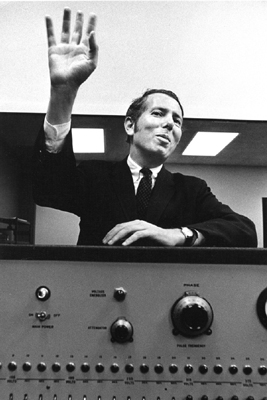Home > Lenten Blog 2025
Follow the Leader
April 4, 2025

Wisdom 2:1a, 12-24 | John 7:1-2, 10, 25-30| Psalm 34:15-22
In Wisdom 2:1a, 12-24, it is said, “God created us for incorruption, and made us in the image of his own eternity.” In these words, there is validation that there is goodness in the core of who and what we are. While this passage acknowledges our inherent potential, it primarily focuses on how humanity can be “led astray” and partake in testing Jesus and making a “trial of his forbearance.”
I know I am not alone in struggling with the paradox that, while I believe the vast majority of people are sincerely well-meaning and good, our past is filled with evil, horrific events that humankind has inflicted upon itself. Our history is peppered with war, genocide, conflict, and hate. Rather than embrace and follow Jesus, the mob of humanity shouts, “Crucify him.”
During my undergraduate years, I found the insights from my studies in Social Psychology helpful in explaining how good people become complicit in the horrors of humanity. For example, Stanley Milgram’s famous study of obedience sheds some light on how people are influenced by authority figures. I distinctly remember sitting in class watching the black-and-white videos of the Milgrim Study. Many participants were visibly upset, yet they continued to follow the authority figure’s instructions and administered what they believed to be potentially lethal electric shocks to an innocent person in another room.
I wanted to believe that I would have been one of the strong, defiant individuals who refused to continue to follow the commands of the man with the white coat and clipboard. I could not imagine I would move forward hearing the (pre-recorded) screams of the innocent participant receiving shocks in the other room. But I would also expect that none of the people who continued to push the levers they believed were administering electric shocks with an ever-increasing voltage – even with the voice in the other room pleading to stop – would have thought they would have done so, either.
But they did.
Social Psychology teaches us that the authority figure and the mob ever influence us. As with those in Wisdom 2:1a, 12-24 who looked to test Jesus “with insult and torture,” it may be easier than we expect to be blinded by wickedness and become enmeshed in a throng of hateful judgment. It is frighteningly easy for us to be led astray, follow the leader, and subconsciously justify our actions by the fact that ‘everyone else is doing it, so it must be okay.’ Including this lens in reading scripture provides a reminder that we must be ever vigilant in listening for God in our world and discerning how to proceed in ways that are true to the teachings of Jesus.
Jennifer Cormier
Image from the Yale University Library


